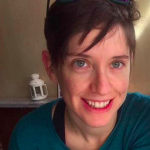
Dr. Eleanore Sternberg, PBEE (2012), advised by: Dr. Jaap de Roode
Currently a postdoc at the Pennsylvania State University
https://eleanoresternberg.wordpress.com/
PSW: Did you have in mind multiple places when you considered a post-doc or did you know from the beginning 1 school/mentor that you wanted to work at/with?
PSW: When determining a mentor, was it someone who already knew through a colleague or conference, or did you cold call/e-mail someone?
ES: I met my postdoc mentor, Matt, at a conference. He has worked in collaboration with Andrew Read, Jaap’s PhD advisor, who I had met previously through Jaap and who was also at the conference. They recruited me together and technically I am supervised by both Matt and Andrew, but I work much more closely with Matt (and I’m funded by his grant). So, it was a combination of connections through Jaap and running into Matt and Andrew at a conference at the right time.
PSW: How far in advance did you apply for funding? What was the timeline as far as defending, applying for funding, and moving/beginning a postdoc?
ES: I definitely wouldn’t consider myself a model grad student when it comes to planning for a postdoc. I started applying to positions less than a year before I needed to defend. I only applied for one source of funding (the FIRST fellowship) and for the most part I focused on positions that were already funded. I didn’t set my defense date until after I had a job offer. I moved and started my postdoc only a couple weeks after I defended. It was pretty stressful at the time but it’s worked out well for me in the end. I think a big part of why I was able to do it this way was that I’d already published two of my data chapters and a third chapter was close to ready for submission so writing up my dissertation went pretty quickly and painlessly.
PSW: What made you choose the school that you did? What skills or experiences are you looking to gain from your post-doc?
ES: My current postdoc is a 3 year position that ends this month. I’m really enjoying my postdoc and especially with the big switch in systems, I wouldn’t want to do anything shorter than 3 years. I’m now transitioning into a more senior research position, still at Penn State, working on a grant from the Gates Foundation. I helped my mentor prepare and submit the grant, and it builds in the research that I was involved with as a postdoc. Ultimately I would like to work in the field of public health. I’d really like to work for an organization like the Gates Foundation where I could have a hand in how money is spent in controlling vector borne diseases.
